 This Great Hemisphere by Mateo Askaripour
This Great Hemisphere by Mateo Askaripour Format: eARC
Source: supplied by publisher via Edelweiss
Formats available: hardcover, paperback, large print, ebook, audiobook
Genres: dystopian, science fiction, speculative fiction, political thriller
Pages: 432
Published by Dutton Books on July 9, 2024
Purchasing Info: Author's Website, Publisher's Website, Amazon, Barnes & Noble, Kobo, Bookshop.org, Better World Books
Goodreads
From the award-winning and bestselling author of Black Buck : A speculative novel about a young woman—invisible by birth and relegated to second-class citizenship—who sets off on a mission to find her older brother, whom she had presumed dead but who is now the primary suspect in a high-profile political murder.
Despite the odds, Sweetmint, a young invisible woman, has done everything right her entire life—school, university, and now a highly sought-after apprenticeship with one of the Northwestern Hemisphere’s premier inventors, a non-invisible man belonging to the dominant population who is as eccentric as he is enigmatic. But the world she has fought so hard to build after the disappearance of her older brother comes crashing down when authorities claim that not only is he well and alive, he’s also the main suspect in the murder of the Chief Executive of the Northwestern Hemisphere.
A manhunt ensues, and Sweetmint, armed with courage, intellect, and unwavering love for her brother, sets off on a mission to find him before it’s too late. With five days until the hemisphere’s big election, Sweetmint must dodge a relentless law officer who’s determined to maintain order and an ambitious politician with sights set on becoming the next Chief Executive by any means necessary.
With the awe-inspiring defiance of The Power and the ever-shifting machinations of House of Cards , This Great Hemisphere is a novel that brilliantly illustrates the degree to which reality can be shaped by non-truths and vicious manipulations, while shining a light on our ability to surprise ourselves when we stop giving in to the narratives others have written for us.
My Review:
Shakespeare said it best, but the Bard said an awful lot of things very, very well, which is why we keep quoting him. In The Merchant of Venice (Act 1, Scene 3), there’s a famous proverb that says that, “The devil can cite Scripture for his purpose.” It’s something the reader is forced to reckon with in This Great Hemisphere – even if the characters for the most part don’t have the education to recognize the phenomenon.
They’re not supposed to. That’s part of the story. In fact, a more accurate paraphrase of that quote as it applies to This Great Hemisphere would be that “the devil can WRITE Scripture for his purpose.” because that is exactly what has happened during the five centuries between our now and the future experienced by Sweetmint and her people.
As Sweetmint discovers over the course of this story, there’s another quote that applies even more, from a part of the Bible that the powers-that-be of the Northwestern Hemisphere have undoubtedly excised as part of their thoroughgoing revision of Scripture to suit their purposes. It’s the one from Ecclesiastes (1:9) that goes: “What has been will be again, what has been done will be done again; there is nothing new under the sun.” Or as it was put more succinctly in Battlestar Galactica, “This has all happened before. All of this will happen again.”
But Sweetmint and her friends do not know any of this when her story begins. It may have all happened before – in fact it has all happened before – but it hasn’t happened before TO HER and her perspective is what carries the story from hope and compliance to desperation, rebellion and tragedy. And maybe, just maybe, back to hope – or at least a brief approximation thereof.
But what is it that has happened before? Sweetmint’s story – or the story that takes place around her and through her, is just the kind of metaphor that science fiction does well when it takes an issue that is real and present – and generally terrible – and shifts it in time and space, alters just a few of the parameters – and forces the reader to see an obscured truth for what it really is.
This Great Hemisphere is set on Earth, five centuries into a future where a portion of the human population is born invisible. Because humans are gonna human, and governments always need a common enemy to class as less than human to keep everyone else in line, invisibles have been cast as a threat and dehumanized in every way possible. They are denied higher education, voting rights, land ownership, good jobs, good housing, etc., etc., etc. Denied all of those things by law and forced to live in remote villages so that the dominant population can never really know them so that they can be more easily demonized.
Sweetmint is supposed to be a “model Invisible” and has earned a place as an intern – not a servant, but an actual intern – with one of the men responsible for the creation of this system. He’s using her for the next step in his “great plan”.
But we see this broken society through Sweetmint’s eyes as the scales are removed from them. She learns that nothing she believes bears much of any resemblance to any objective truth and that the system is rotten from within – always has been and intends to always be so.
What makes the story so compelling is that even as we watch it unravel, we’re still riveted by her attempts to force a new way through. That even though it may be hopeless in the long run, there can be a reprieve in the short run – and possibly more. And we’re there for her and for it – even if the specific future she hoped for is not.
Escape Rating A-: I obviously had a lot of thoughts about this as I was reading it, and I have more. It’s that kind of book.
It does absolutely fly by. The author has done an excellent job of creating a world that is firmly rooted in the history we know and yet manages to shine a light on it from a different corner. Using invisibility as a metaphor for race allows the reader to be firmly grounded in our own historical perspective and yet provides a vector by which anyone can imagine themselves as Sweetmint because there are circumstances in which anyone can be rendered invisible.
I’m all over the map on what I thought and felt about this book, and it’s making writing it up all kinds of difficult. On the one hand, as I said, it’s compelling to read. On a second hand, I felt like the social issues part was a bit heavy-handed – but at the same time, I recognize that my own background makes me more familiar with some of the issues – albeit from a slightly different angle, and as someone whose read a lot of history the repetitive patterns are not exactly news.
From the point of view of someone who reads a lot of science fiction, this very much fits into the spec fic, SFnal tradition of exploring an all too real past and present issue by setting it in either a time or place away from the here and now. Something that even the original Star Trek series did both well and badly – sometimes at the same time – and there’s an episode that’s particularly on point in this regard, Let That Be Your Last Battlefield.
In other words, in yet another attempt to make a long story short and probably fail at it again, This Great Hemisphere is a compelling story, both because of Sweetmint’s originally naive perspective and because the actual political machinations going and increasing enmeshment in the consequences of them – sometimes intentionally but often not. And the ending – oh that was a stunner in a way that just capped off the whole thing while still leaving just a glimmer of possibility – if not necessarily a good one – for the world in which it happens.

 We Speak Through the Mountain (Annual Migration of Clouds, #2) by
We Speak Through the Mountain (Annual Migration of Clouds, #2) by  Escape Rating B+: I had not read
Escape Rating B+: I had not read  Service Model by
Service Model by 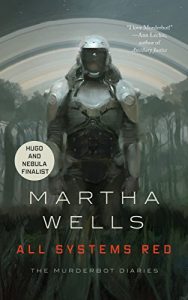 Escape Rating A+: I went into this completely unsure of what to expect, and that blurb of
Escape Rating A+: I went into this completely unsure of what to expect, and that blurb of  To Gaze Upon Wicked Gods (Gods Beyond the Skies, #1) by
To Gaze Upon Wicked Gods (Gods Beyond the Skies, #1) by  Lost Ark Dreaming by
Lost Ark Dreaming by 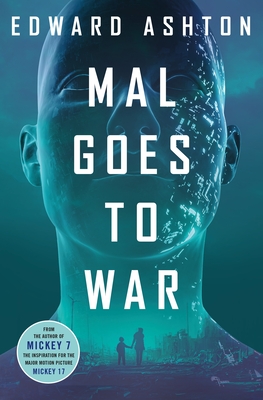 Mal Goes to War by
Mal Goes to War by 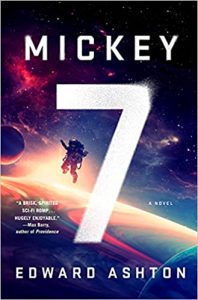 Because Mal isn’t human at all. He’s a free A.I., or as his people prefer to be called, a Silico-American. He’s merely observing this stupid war from the perspective of an otherwise fairly autonomous but not intelligent drone when he gets the wild and crazy idea to see what it would be like to have a body.
Because Mal isn’t human at all. He’s a free A.I., or as his people prefer to be called, a Silico-American. He’s merely observing this stupid war from the perspective of an otherwise fairly autonomous but not intelligent drone when he gets the wild and crazy idea to see what it would be like to have a body.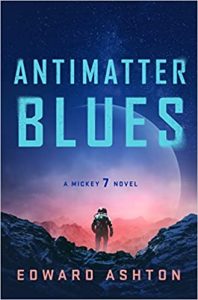 What hooks the reader, or at least this reader, from the very first page is Mal’s conversation with his two fellow A.I.s, Clippy and !HelpDesk. They’re all snarky to the max, and none of them think much of humanity. To them, we’re entertainment – and we’re bad, boring entertainment at that.
What hooks the reader, or at least this reader, from the very first page is Mal’s conversation with his two fellow A.I.s, Clippy and !HelpDesk. They’re all snarky to the max, and none of them think much of humanity. To them, we’re entertainment – and we’re bad, boring entertainment at that.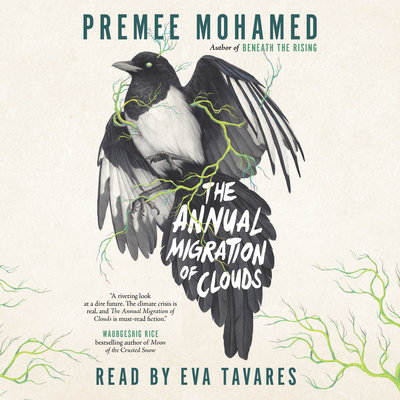 The Annual Migration of Clouds by
The Annual Migration of Clouds by 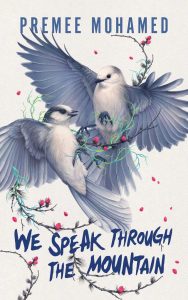 Escape Rating A-: I picked up this book because I read the sequel to this,
Escape Rating A-: I picked up this book because I read the sequel to this, 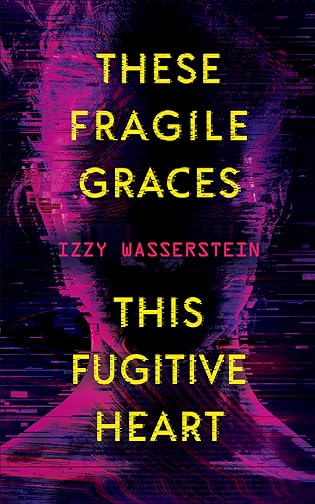 These Fragile Graces, This Fugitive Heart by
These Fragile Graces, This Fugitive Heart by 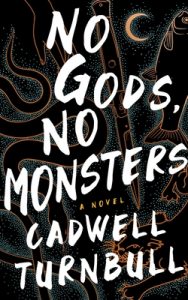 I also would have loved a bit more about the anarchist and commune movement as it applied to this particular story, because I was basing all of my knowledge and acceptance of the way that part of their world worked on Cadwell Turnbull’s fantastic
I also would have loved a bit more about the anarchist and commune movement as it applied to this particular story, because I was basing all of my knowledge and acceptance of the way that part of their world worked on Cadwell Turnbull’s fantastic 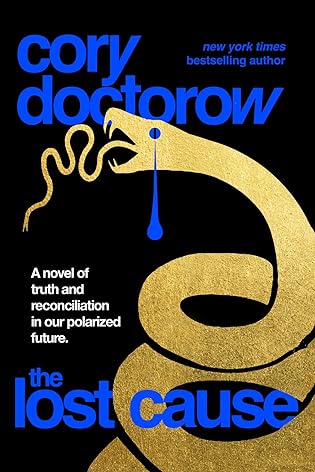 The Lost Cause by
The Lost Cause by 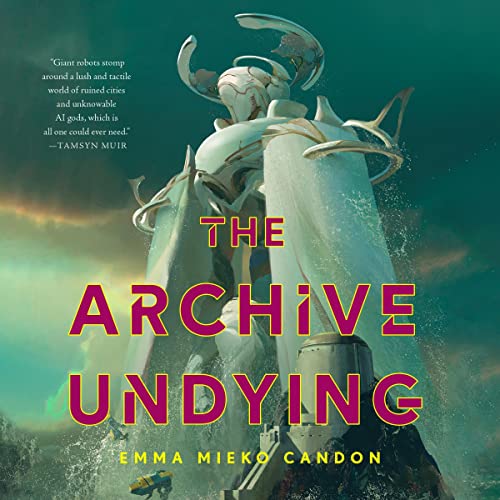 The Archive Undying (The Downworld Sequence, #1) by
The Archive Undying (The Downworld Sequence, #1) by 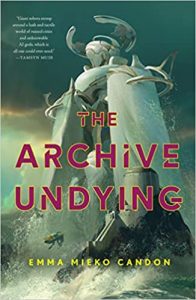 Escape Rating B: I listened to The Archive Undying in its entirety, and I have to say that its the narrator that carried me through all SIXTEEN AND A HALF HOURS. The narrator didn’t just do a good job of voicing all the many, many characters, but by literally being in their heads and not my own it allowed me to care enough about the individuals to be willing to experience the whole constantly twisting saga. If I’d been reading this as text, if I’d been in my head instead of theirs, I’d have DNF’d fairly early because the sheer number of changes in perspectives combined with unsatisfying hints of the world they occurred in would have driven me mad in short order. YMMV.
Escape Rating B: I listened to The Archive Undying in its entirety, and I have to say that its the narrator that carried me through all SIXTEEN AND A HALF HOURS. The narrator didn’t just do a good job of voicing all the many, many characters, but by literally being in their heads and not my own it allowed me to care enough about the individuals to be willing to experience the whole constantly twisting saga. If I’d been reading this as text, if I’d been in my head instead of theirs, I’d have DNF’d fairly early because the sheer number of changes in perspectives combined with unsatisfying hints of the world they occurred in would have driven me mad in short order. YMMV.